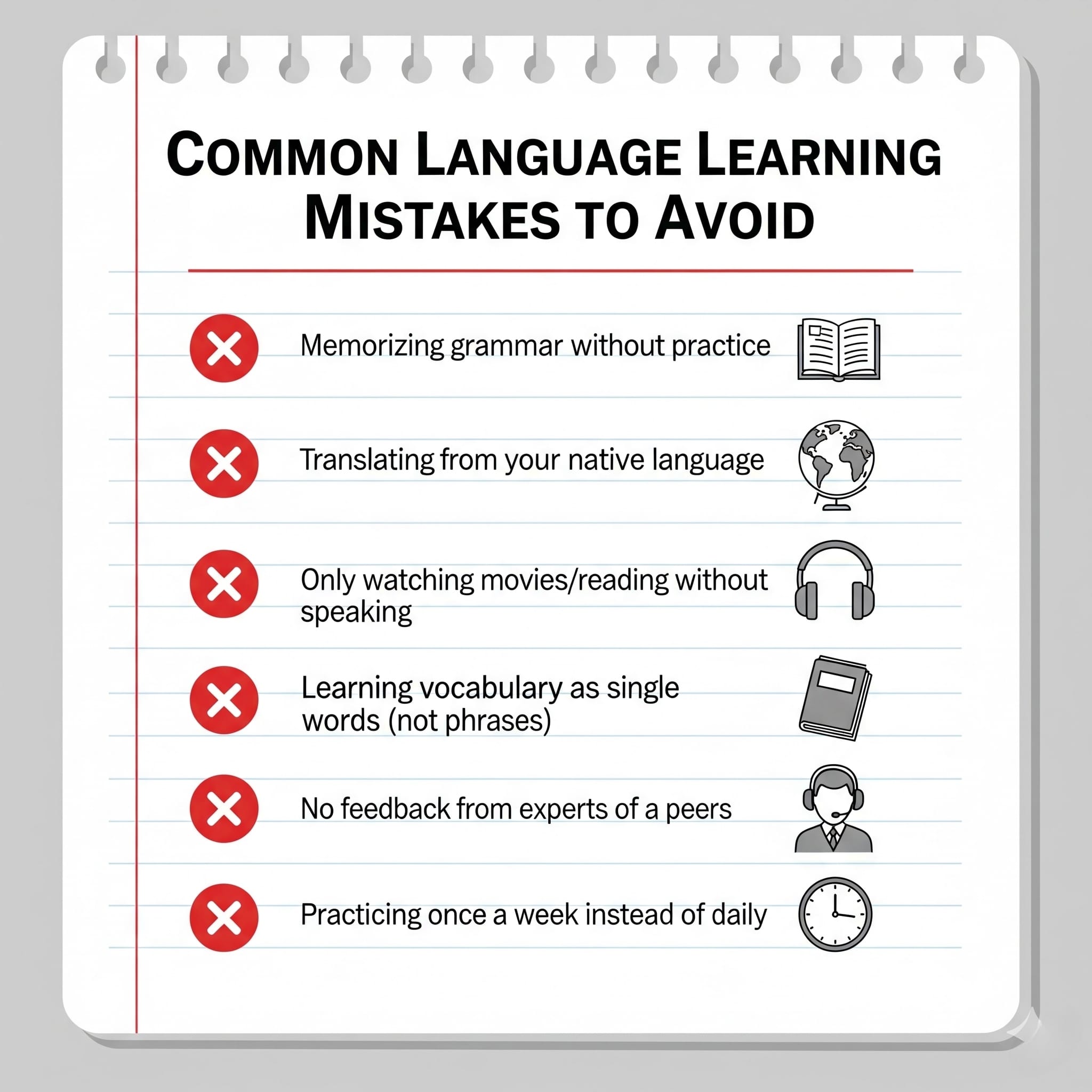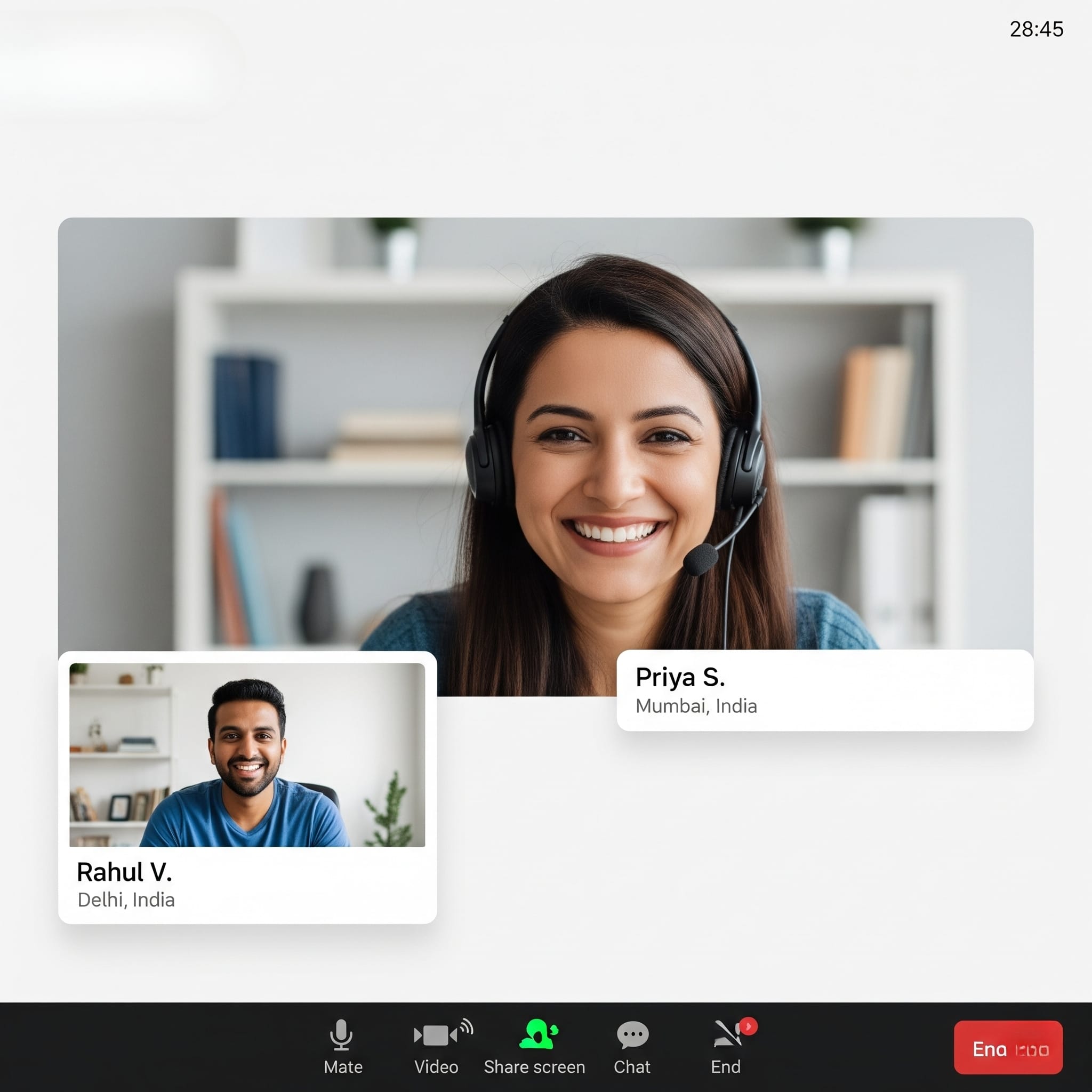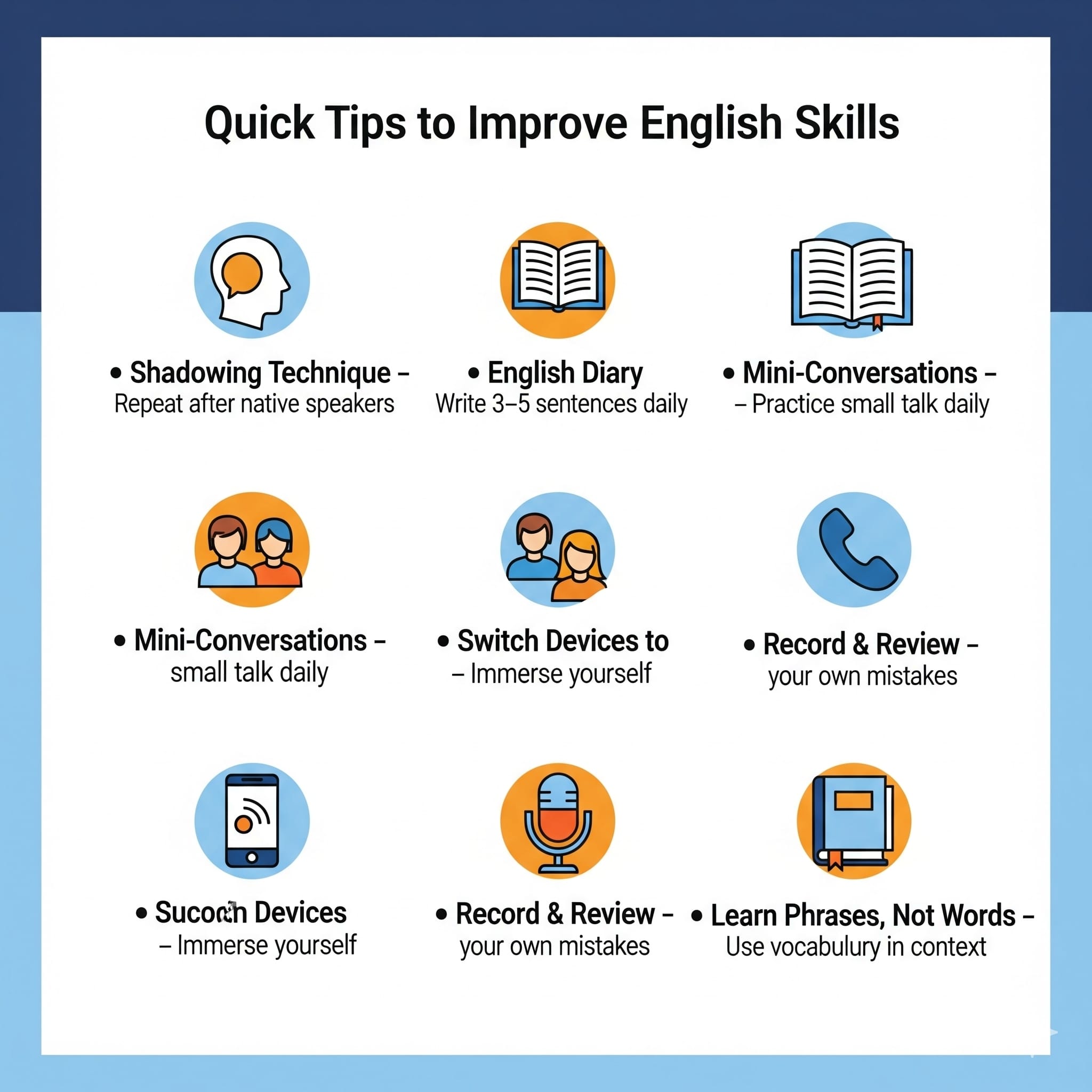20 Reasons Why Your English Isn’t Improving (And How to Fix It)
Struggling to improve English skills despite studying daily? Learn the real reasons your English isn’t improving and how to fix it with proven tips, common past tense verbs mistakes, and practical solutions.

Why Your English Isn’t Improving (And How to Fix It)
You’ve been learning English for months. You’ve joined classes, watched videos, and even practiced grammar worksheets. Yet, when it’s time to speak or write, you feel stuck. Sounds familiar?
Many learners face this exact challenge. The good news is: you’re not “bad at languages.” You’re just making some common mistakes. In this blog, we’ll uncover why your English isn’t improving and—more importantly—what you can do to fix it.
By the end, you’ll have a clear action plan to finally improve English skills with confidence.
The Illusion of Learning Without Practicing
One of the biggest mistakes learners make is focusing too much on input (reading and listening) without output (speaking and writing).
You may read articles daily but never try writing your own.
You watch English movies but avoid speaking in real life.
This creates the illusion that you’re learning. In reality, your brain stores knowledge passively without building active recall.
Fix: For every 20 minutes of reading, spend 10 minutes writing or speaking about it in your own words.
Example: Read a news or any article, then record a short 1-minute voice note summarizing it.
Fear of Making Mistakes
Fear is the invisible wall stopping your progress. Many learners think:
“What if I sound wrong?”
“People will laugh at me.”
This mindset kills practice opportunities. Remember, no one became fluent without making mistakes.
Fix: Reframe mistakes as feedback. Every error is proof that you are learning.
Clapingo Tip: On Clapingo, you get to speak with experts who gently correct your mistakes while boosting your confidence. Unlike a classroom, it’s one-on-one and personalized.
Over-Focusing on Grammar Rules
Yes, grammar is important. But learning grammar in isolation without real practice can slow you down.
For example, many learners memorize lists of past tense verbs but struggle to use them naturally in conversation.
Correct: Yesterday, I went to the market.
Incorrect: Yesterday, I go to the market.
Memorization without usage leads to forgetting.
Fix: Instead of memorizing 50 past tense verbs in one go, practice 5 in real sentences daily.
Mini Activity: Write or say 5 sentences about what you did yesterday using different past tense verbs.
Translation Trap
Thinking in your native language and then translating into English causes slow, broken sentences.
Example:
Native thought: Kal maine chai pi.
Translation: Yesterday I tea drank.
Correct English: Yesterday, I drank tea.
Fix: Train your brain to think in English with small steps. Label objects around you in English. Narrate simple actions in real-time: “I am opening the door.”
Clapingo Hack: Clapingo lessons include “thinking in English” drills where you speak spontaneously without translation. This helps your brain form direct English connections.

Why Your English Is Not Improving
Lack of Consistency
Practicing English once a week won’t lead to results. Language learning needs daily consistency.
Even 15 minutes daily is more powerful than 2 hours once a week.
Fix: Create a routine:
Morning: Read a short article.
Afternoon: Write a short message in English.
Evening: Speak for 2 minutes on any topic.
Passive vs Active Vocabulary
You understand hundreds of English words when you hear them. But can you use them while speaking? Probably not. That’s passive vocabulary.
Fix: Turn passive into active:
Step 1: Pick 3 new words daily.
Step 2: Use each word in 2–3 sentences.
Step 3: Use them in a real conversation.
You’re Not Tracking Progress
Without measurement, you won’t see improvement. And when you don’t see improvement, you lose motivation.
Fix:
Record yourself speaking once a week.
Note mistakes and compare progress monthly.
Keep a “word bank” of phrases you’ve mastered.
The Role of Past Tense Verbs in Fluency
Why focus on past tense verbs? Because most daily conversations involve retelling events: what you did, what happened, where you went.
Common past tense verbs to master:
- went
- did
- ate
- said
- bought
- thought
- came
Example Sentences:
I went to the office early.
She said she was tired.
We bought a new laptop yesterday.
Mastering these boosts fluency in storytelling and daily talks.|
Wrong Learning Materials
Not all English learning resources are equal. Many learners use outdated textbooks or random grammar videos that confuse more than they teach.
Fix: Choose materials based on your goals. If you want to improve English speaking skills, focus on conversation-based resources, not just written grammar books.
Clapingo Note: Every Clapingo session uses real-life topics like interviews, office meetings, or casual chats—so you learn useful English, not textbook English.
You’re Listening but Not Imitating
Listening to English podcasts or movies is great, but just listening won’t make you fluent. Imitation builds fluency.
Fix: Try “shadowing.” Listen to a short clip and repeat it aloud, copying pronunciation, tone, and speed.
👉 Example: Listen to “I went to the market yesterday” and say it out loud, matching the speaker.
Avoiding Conversations with Fluent Speakers
Many learners practice only with friends at the same level. This keeps you in a comfort zone.
Fix: Seek conversations with fluent speakers who can push your level higher.
✨ Clapingo Advantage: You get daily speaking practice with English experts who guide, correct, and motivate you.

Not Using English in Daily Life
You may “study English” for an hour but spend the rest of the day in your native language. That limits progress.
Fix: Create immersion:
Change your phone to English.
Write your to-do list in English
Talk to yourself in English.
Ignoring Pronunciation and Accent
Even if your grammar is correct, unclear pronunciation may stop others from understanding you.
Fix: Practice difficult sounds daily. Record and compare your pronunciation with native speakers.
Example: Practice words like “thought, bought, caught” with clear sounds.
Focusing Only on Writing, Not Speaking
Many learners are great at writing but freeze when asked to speak. Writing alone doesn’t build fluency.
Fix: Balance writing with speaking practice. Use your written notes as scripts for spoken practice.
Not Revising What You Learn
Learning 20 words today is useless if you forget 15 tomorrow. Lack of revision is a major reason why English doesn’t improve.
Fix: Use spaced repetition. Revise words and phrases at set intervals: after 1 day, 1 week, 1 month.

Over-Studying Without Action
Reading blogs, watching grammar videos, and downloading apps is easy. Taking action is harder.
Fix: Follow the 80/20 rule. Spend 20% of your time learning, 80% practicing.
👉 Example: Instead of watching 5 grammar lessons, watch 1 and practice it in 10 sentences.
Comparing Yourself to Others
Many learners lose confidence by comparing their progress to others. “My friend speaks better than me” kills motivation.
Fix: Track your own growth. Compare your today’s performance to last month—not to others.
Lack of Clear Goals
Saying “I want to improve English skills” is too vague. Without clear goals, you don’t know what to measure.
Fix: Set SMART goals.
Bad goal:
“I want to be fluent.”
Good goal:
“I will practice past tense verbs in 10 sentences daily for 30 days.”
Check this out next: How to Learn English Fast: Fast Track to Fluency and Confidence
Ignoring Real-World Practice Opportunities
Many learners wait for “perfect English” before speaking. The truth? You learn faster in real conversations.
Fix: Start small:
Order food in English.
Introduce yourself in English at work.
Ask a colleague a simple English question.
Not Getting Feedback
Without feedback, you keep repeating the same mistakes. This is especially true with past tense verbs, most learners keep saying I go yesterday instead of I went yesterday.
Fix: Get a teacher, coach, or speaking partner who can correct you.
Clapingo Solution: Clapingo experts don’t just listen—they give instant corrections on grammar, pronunciation, and sentence structure so you improve every session.
Did You Know?
Studies show that learners who speak for at least 5 minutes daily in their target language improve 3x faster than those who only study grammar.
Tips & Tricks to Improve English Skills
Practice “mirror speaking” – talk to yourself in front of a mirror.
Listen to English podcasts while commuting.
Keep an English journal of your daily routine.
Practice common past tense verbs by writing a diary entry every night.
Use apps like Clapingo for real conversations with experts.

Clapingo: Your Shortcut to Fluency
Clapingo is not a traditional classroom. It’s a one-on-one spoken English platform where:
You practice real conversations.
Experts correct your past tense verb mistakes.
Sessions are flexible and personalized to your level.
Result: You start speaking English confidently in weeks, not years.
Try a free Clapingo session today and see the difference.
If your English isn’t improving, it’s not your fault—it’s your strategy. Avoid traps like over-focusing on grammar, fearing mistakes, or skipping feedback. Focus instead on speaking daily, mastering past tense verbs, and using English in real life.
With the right plan and consistent practice, you can finally improve English skills and speak with confidence.
Comments
Your comment has been submitted